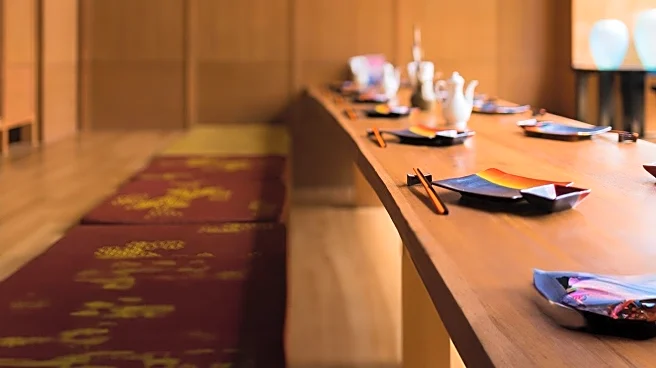What's Happening?
The JW Marriott Hotel Tokyo is undergoing a significant expansion in the Japanese market, situated in the newly developed Takanawa Gateway City district. The hotel's design, conceived by the firm Yabu
Pushelberg, draws heavily from Zen principles and the local natural environment to create an aesthetic focused on tranquility and harmony. This is manifested through architectural elements and curated art installations, including abstract pieces and a glass feature incorporating organic materials. The hotel offers 200 guest accommodations, utilizing a palette of serene colors and natural textures. Additionally, the company plans to introduce a specific category of rooms dedicated to holistic wellness later in the year. The hotel's culinary establishments are led by a seasoned culinary director and feature collaborations with chefs from recognized Michelin-starred backgrounds.
Why It's Important?
The expansion of the JW Marriott Hotel Tokyo highlights the growing trend of wellness tourism, which focuses on guest health and relaxation. By integrating Zen principles and holistic wellness rooms, the hotel aims to differentiate itself from competitors and cater to the increasing demand for personalized guest experiences. This move reflects a broader industry shift towards providing exceptional dining experiences and wellness-focused accommodations as key attractions. The emphasis on tranquility and harmony in design may attract travelers seeking a peaceful retreat, thereby boosting the local tourism economy and setting a precedent for other hotels to follow.
What's Next?
The introduction of holistic wellness rooms later in the year is expected to further enhance the hotel's appeal to wellness-focused travelers. As the demand for wellness tourism continues to grow, other hotels may follow suit by incorporating similar design elements and wellness-focused amenities. The collaboration with Michelin-starred chefs may also inspire other establishments to elevate their culinary offerings, potentially leading to a competitive landscape in the hospitality industry. The success of this expansion could influence future developments in the Takanawa Gateway City district, attracting more visitors and investments.
Beyond the Headlines
The integration of Zen principles into hotel design not only caters to wellness tourism but also reflects a cultural appreciation for Japanese aesthetics and traditions. This approach may foster a deeper understanding and respect for local culture among international visitors. Additionally, the focus on holistic wellness aligns with global trends towards self-care and mental health awareness, potentially influencing broader societal attitudes towards wellness and relaxation.









